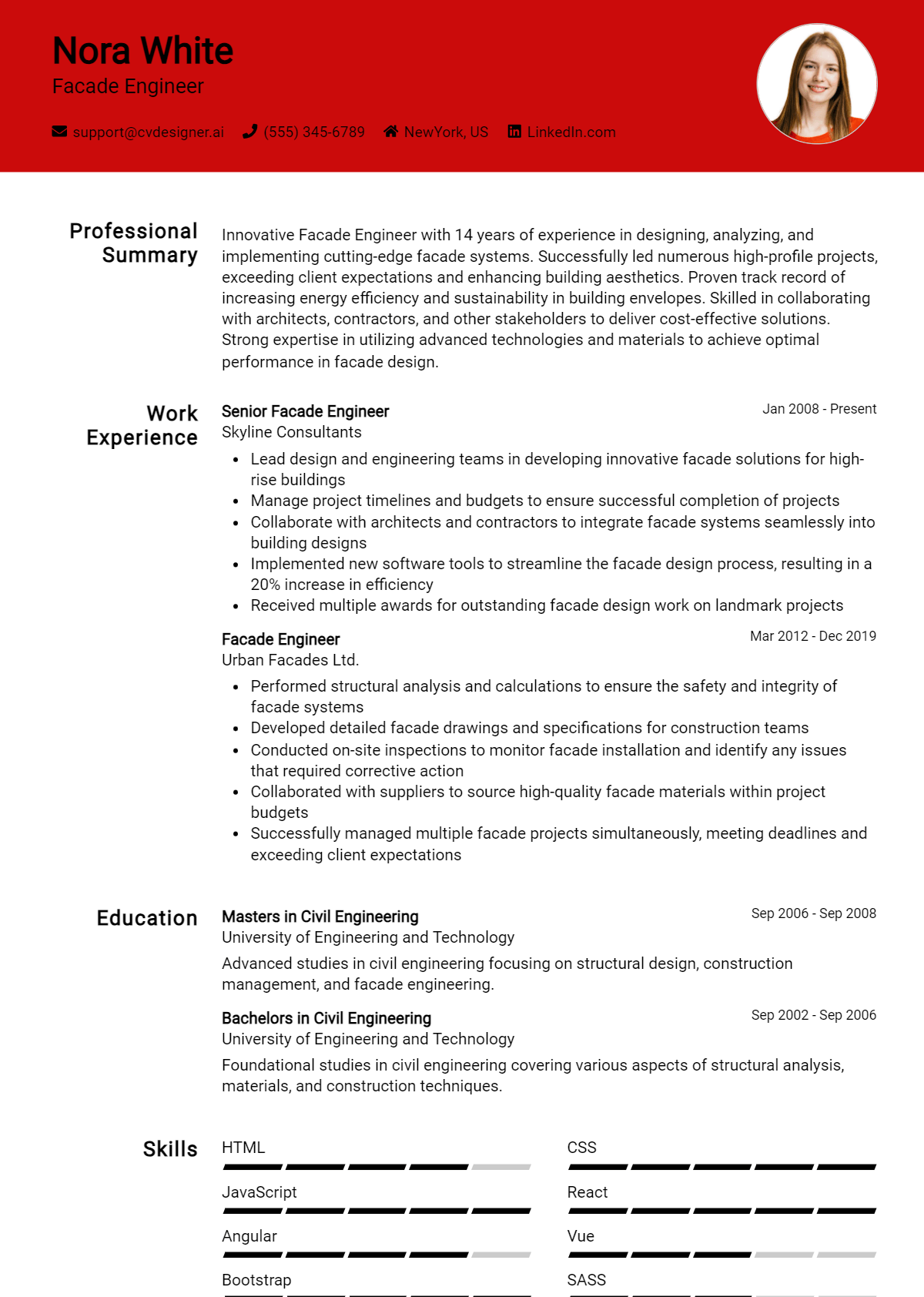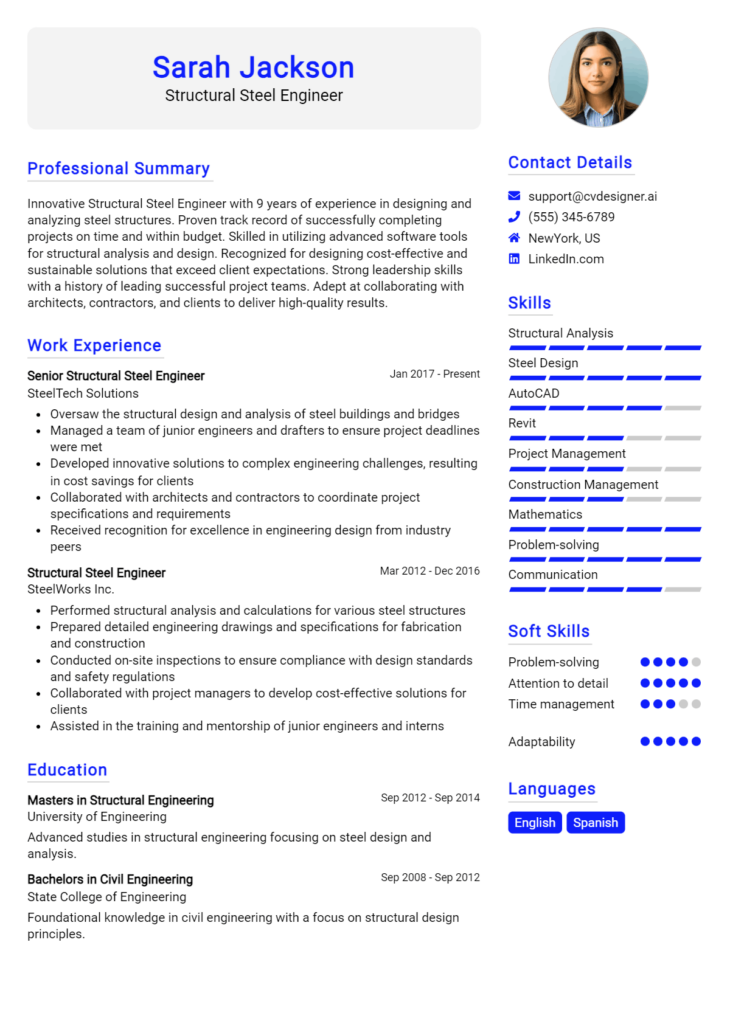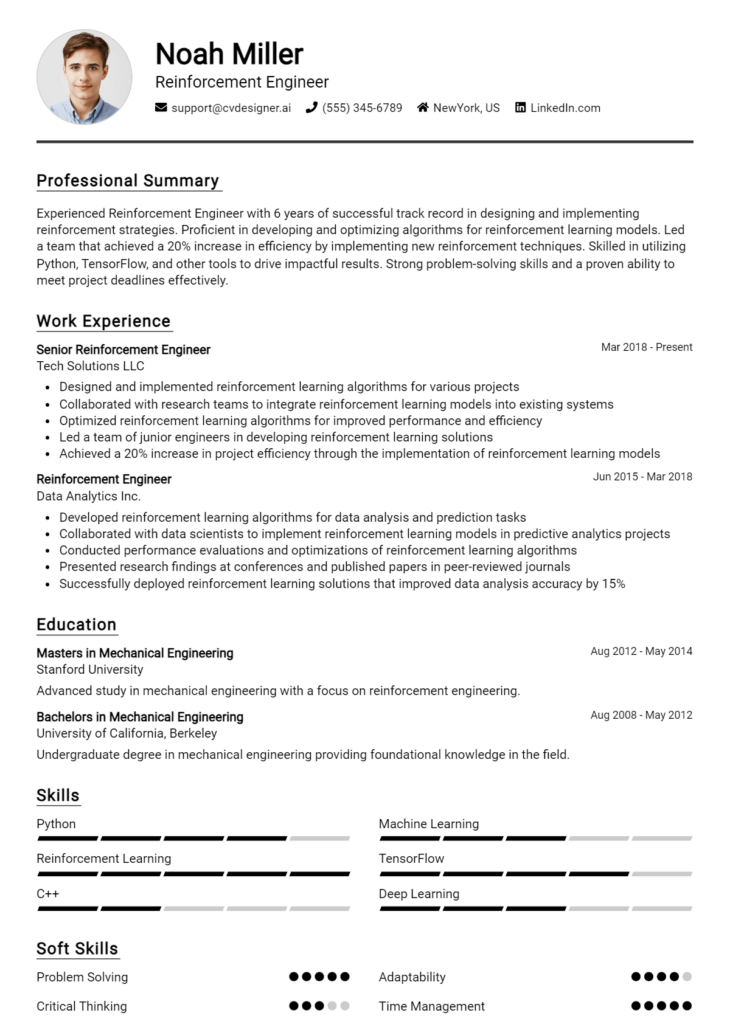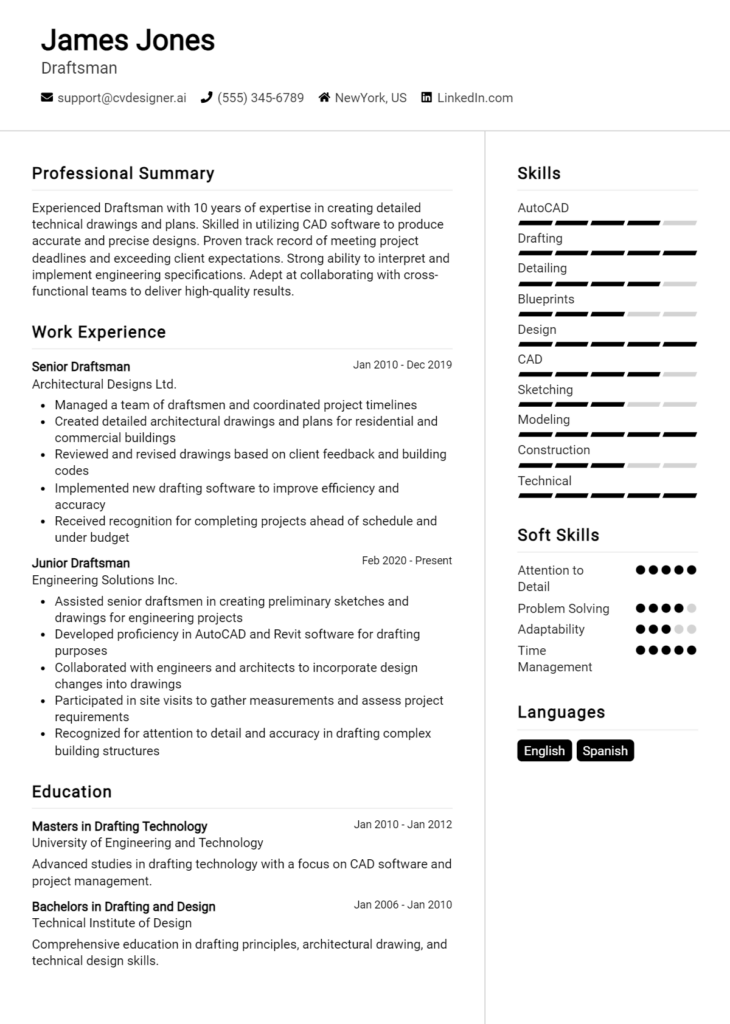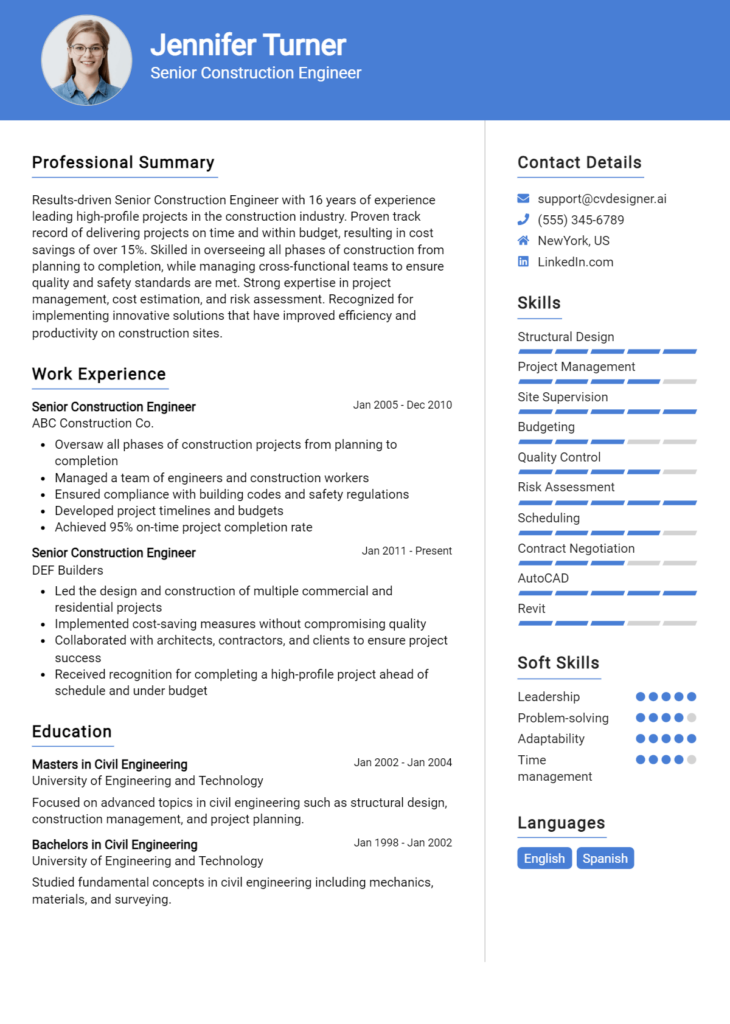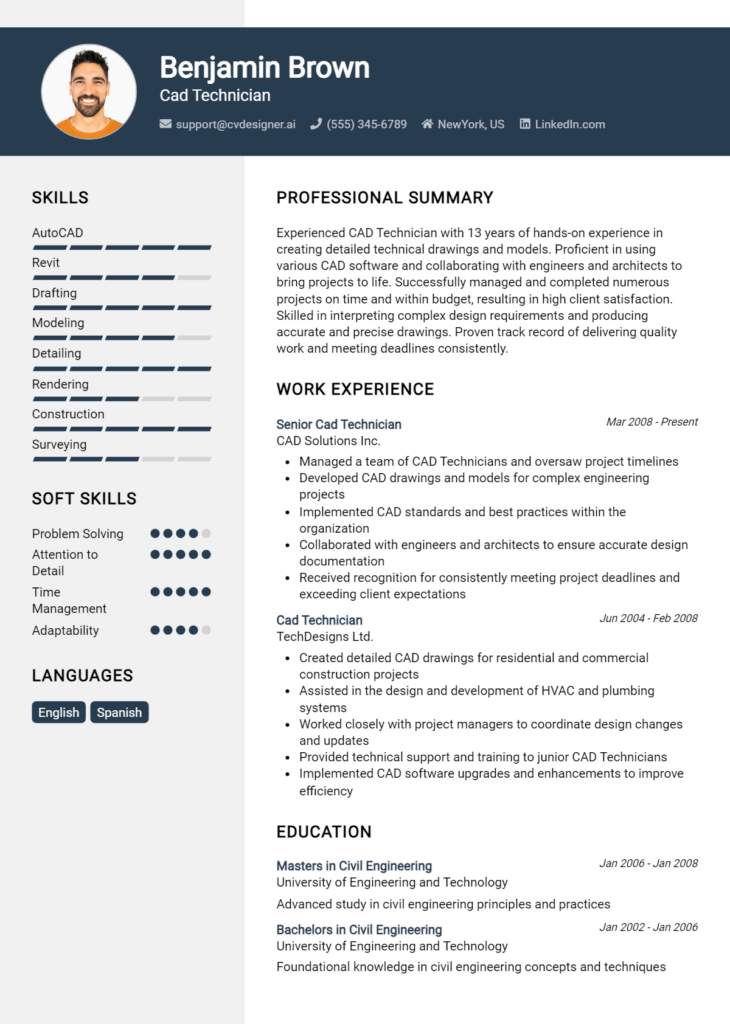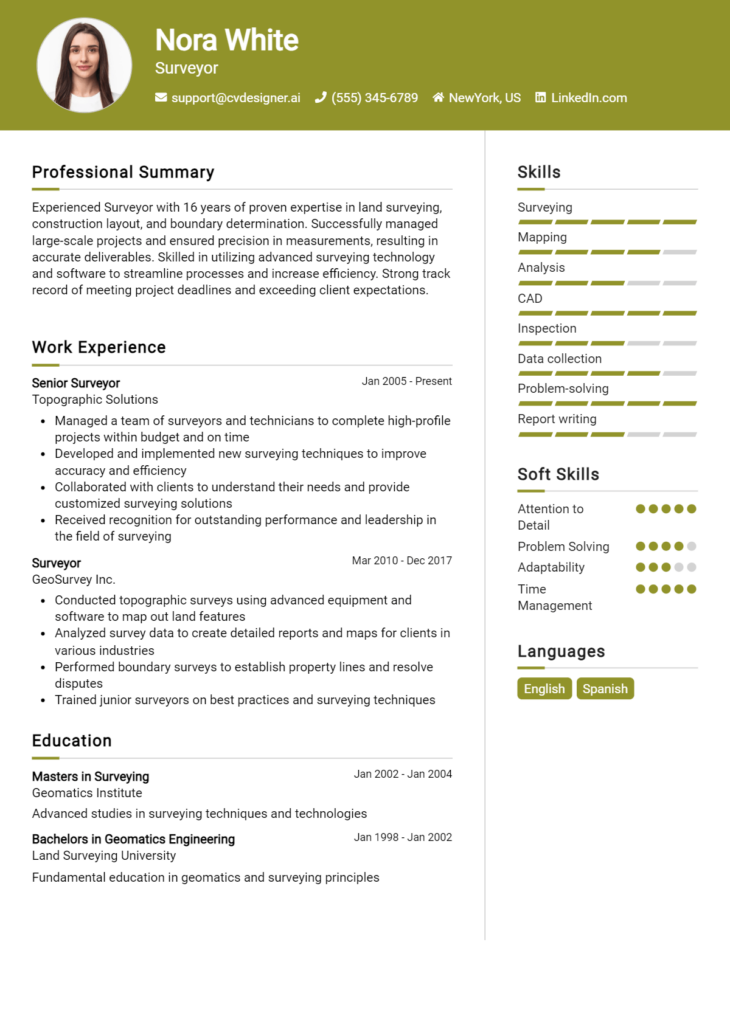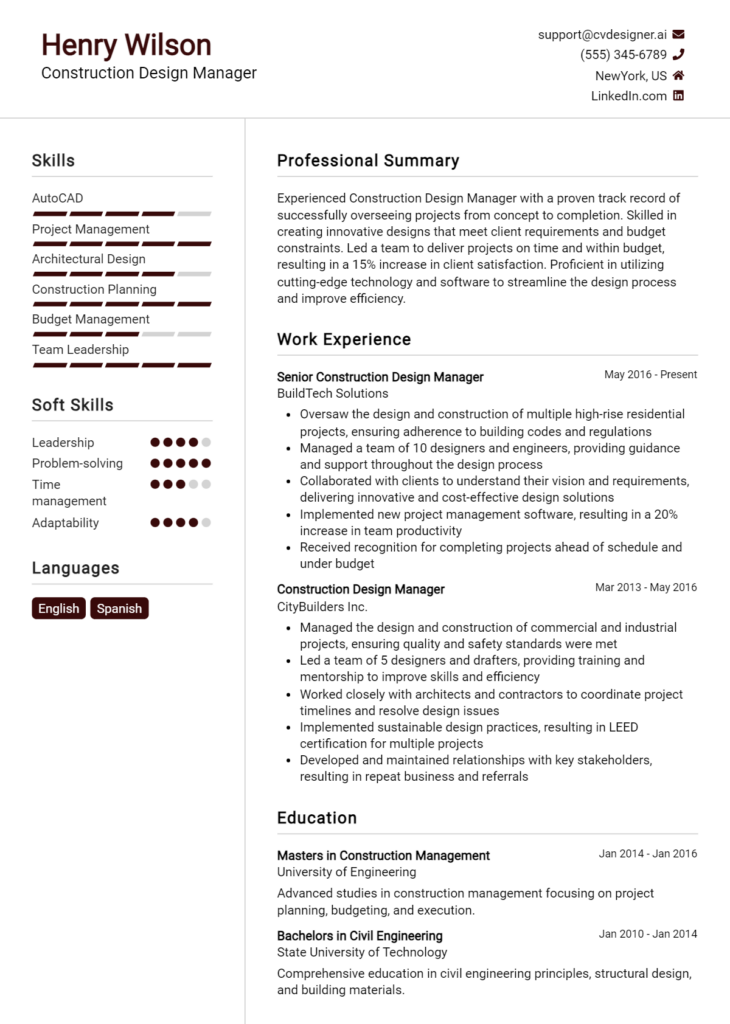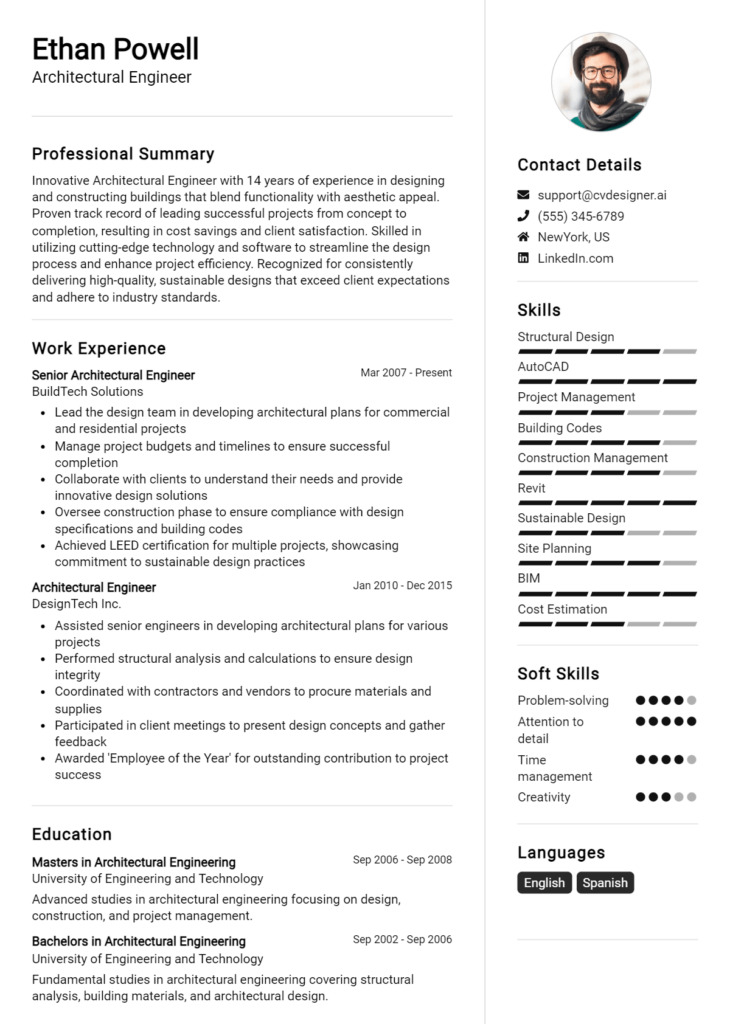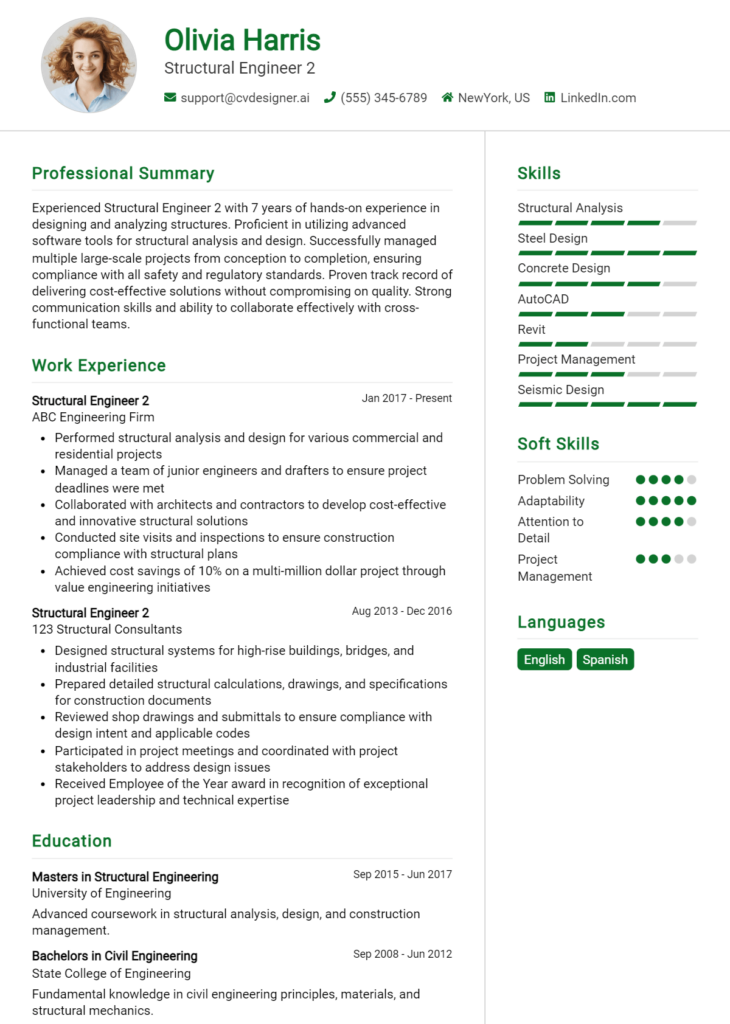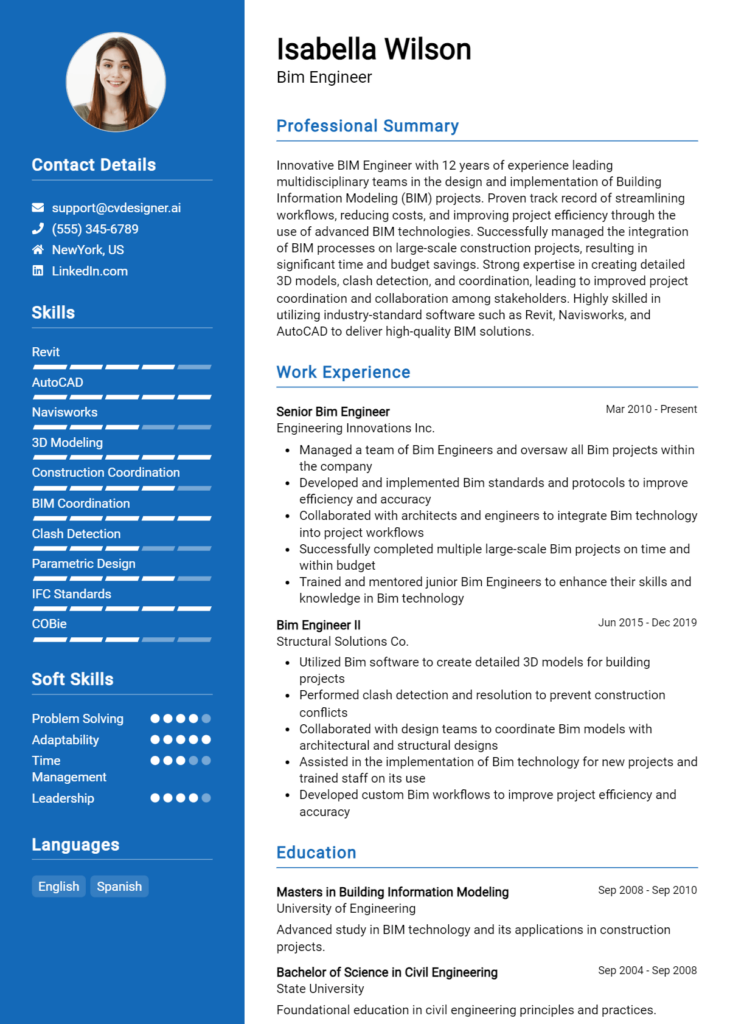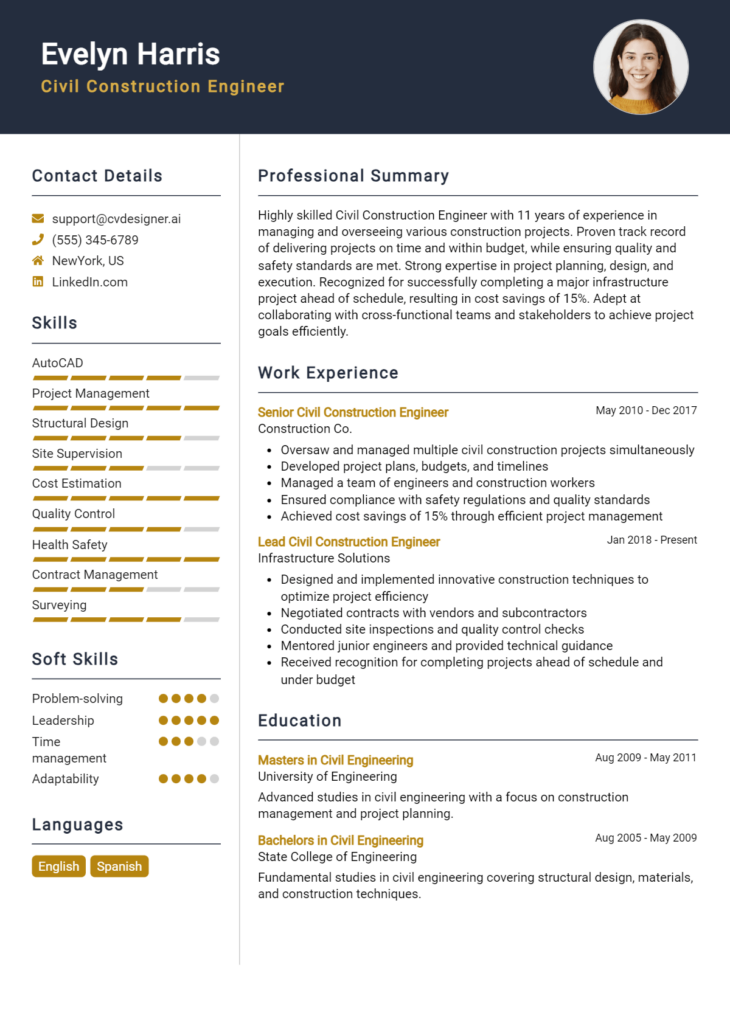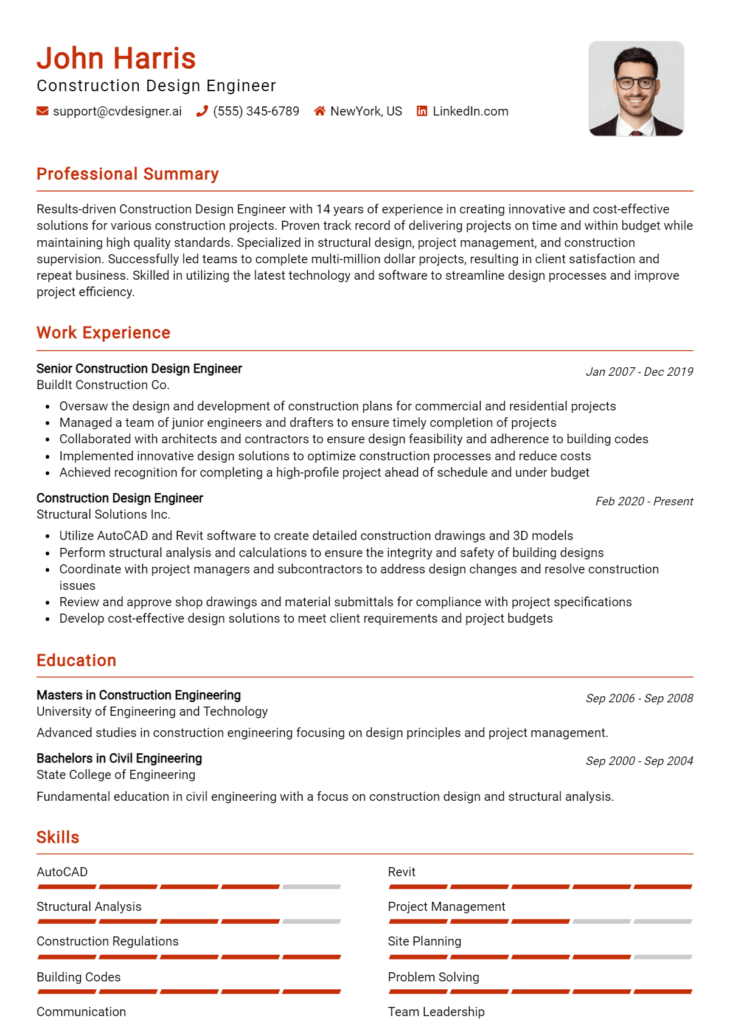Facade Engineer Core Responsibilities
A Facade Engineer plays a crucial role in the design, analysis, and implementation of building facades, acting as a bridge between architectural, structural, and environmental disciplines. Essential skills include technical proficiency in materials and systems, operational knowledge for project management, and strong problem-solving abilities to address challenges in aesthetics, energy efficiency, and safety. These competencies not only enhance project outcomes but align with the organization’s strategic goals. A well-structured resume effectively highlights these qualifications, showcasing a candidate's readiness for impactful contributions.
Common Responsibilities Listed on Facade Engineer Resume
- Design and analyze facade systems for performance and aesthetics.
- Collaborate with architects and structural engineers on project specifications.
- Conduct material selection and testing for durability and sustainability.
- Prepare detailed technical drawings and specifications.
- Oversee facade installation and ensure compliance with building codes.
- Perform energy modeling and thermal analysis for facade systems.
- Engage in troubleshooting and problem-solving during the construction phase.
- Coordinate with contractors and suppliers for project execution.
- Conduct site inspections to ensure quality and safety standards.
- Stay updated with industry trends and advancements in facade technology.
- Prepare cost estimates and budgets for facade projects.
High-Level Resume Tips for Facade Engineer Professionals
In the competitive field of facade engineering, a well-crafted resume is essential for making a strong first impression on potential employers. As the gateway to your professional journey, your resume should not only showcase your technical skills and expertise but also highlight your unique achievements that set you apart from other candidates. A compelling resume can significantly impact your chances of landing an interview, as it reflects your understanding of the industry and your ability to meet the demands of the role. This guide will provide practical and actionable resume tips specifically tailored for facade engineer professionals, ensuring you present yourself as a standout candidate.
Top Resume Tips for Facade Engineer Professionals
- Tailor your resume to each job description by incorporating relevant keywords and phrases that match the requirements.
- Highlight your technical skills, such as proficiency in CAD software, structural analysis, and materials selection.
- Showcase your relevant experience by detailing specific projects you have worked on, emphasizing your role and contributions.
- Quantify your achievements wherever possible, using metrics to demonstrate the impact of your work (e.g., cost savings, project timelines).
- Include certifications and licenses that are pertinent to facade engineering, such as LEED or professional engineering licenses.
- Utilize a clean and professional format that enhances readability and draws attention to key sections of your resume.
- Incorporate a summary statement at the top of your resume that succinctly captures your career objectives and core competencies.
- Emphasize collaboration and communication skills, as facade engineering often involves working with architects, contractors, and clients.
- Consider adding a section for continuing education or professional development to showcase your commitment to staying current in the field.
By implementing these tips, you can significantly increase your chances of landing a job in the facade engineering field. A tailored and focused resume will not only highlight your qualifications but also convey your dedication and passion for the profession, making you a more attractive candidate to potential employers.
Why Resume Headlines & Titles are Important for Facade Engineer
In the competitive field of façade engineering, a well-crafted resume headline or title serves as a critical first impression that can significantly influence a hiring manager's perception of a candidate. A strong headline captures attention and succinctly summarizes the candidate's key qualifications in a single impactful phrase. This essential element not only makes the resume stand out in a pile of applications but also sets the tone for the rest of the document. A concise, relevant, and role-specific headline is vital, as it immediately conveys the candidate’s expertise and aligns with the job they are applying for, enhancing their chances of being noticed and considered for the position.
Best Practices for Crafting Resume Headlines for Facade Engineer
- Keep it concise: Aim for one impactful phrase that summarizes your qualifications.
- Be specific: Use terminology related to façade engineering to show relevance.
- Highlight key strengths: Focus on your most significant skills or experiences.
- Tailor for the job: Customize the headline for each application based on the job description.
- Use action words: Start with strong verbs to convey your expertise and contributions.
- Incorporate certifications: Mention relevant certifications or technical skills to add credibility.
- Avoid jargon: Ensure the language is clear and accessible to broaden appeal.
- Test for impact: Consider how the headline sounds and its potential to grab attention.
Example Resume Headlines for Facade Engineer
Strong Resume Headlines
Innovative Facade Engineer with 10+ Years of Experience in Sustainable Building Design
Detail-Oriented Facade Engineer Specializing in High-Performance Envelope Systems
Award-Winning Facade Engineer Committed to Aesthetic and Functional Design Solutions
Dynamic Facade Engineer with Proven Track Record in Project Management and Client Collaboration
Weak Resume Headlines
Engineer Looking for Opportunities
Facade Engineer with Experience
Professional in the Construction Field
The strong headlines are effective because they clearly communicate the candidate's specific expertise, years of experience, and unique contributions to the field of façade engineering, making them memorable and relevant. In contrast, the weak headlines fail to impress due to their vague language and lack of detail, leaving hiring managers without a clear understanding of the candidate’s qualifications or what sets them apart. By avoiding generic terms and instead focusing on specific strengths and accomplishments, candidates can create a compelling first impression that invites further exploration of their resume.
Writing an Exceptional Facade Engineer Resume Summary
A well-crafted resume summary is crucial for a Facade Engineer as it serves as the first impression on hiring managers. This brief introduction can quickly capture their attention by showcasing the candidate's key skills, relevant experience, and notable accomplishments in the field. A strong summary is concise, impactful, and tailored to the specific job the applicant is pursuing, allowing it to effectively highlight why the candidate is the best fit for the role in a competitive job market.
Best Practices for Writing a Facade Engineer Resume Summary
- Quantify Achievements: Use specific numbers or percentages to demonstrate the impact of your work.
- Focus on Relevant Skills: Highlight skills that are directly applicable to the facade engineering role.
- Tailor Your Summary: Customize your summary for each application to align with the job description.
- Be Concise: Keep your summary brief—ideally 3-5 sentences—to maintain the reader's attention.
- Use Action Verbs: Start sentences with powerful action verbs to convey a sense of achievement and proactivity.
- Showcase Industry Knowledge: Mention any specialized knowledge or technologies relevant to facade engineering.
- Demonstrate Problem-Solving: Include examples of how you have addressed challenges in past projects.
- Highlight Collaborative Experience: Emphasize your ability to work with architects, contractors, and other stakeholders.
Example Facade Engineer Resume Summaries
Strong Resume Summaries
Results-driven Facade Engineer with over 8 years of experience in designing and implementing innovative facade systems for commercial buildings. Successfully reduced installation costs by 15% through strategic planning and supplier negotiations on a $5M project.
Detail-oriented Facade Engineer skilled in utilizing BIM technology to enhance design accuracy and collaboration. Spearheaded a team that completed a high-rise project 3 months ahead of schedule, improving client satisfaction ratings by 20%.
Experienced Facade Engineer with expertise in sustainable design practices and energy-efficient solutions. Achieved a 25% reduction in energy consumption for a landmark project by integrating advanced glazing technologies and natural ventilation systems.
Weak Resume Summaries
Facade Engineer with some experience looking for a new opportunity in a challenging environment.
Skilled professional interested in working on building projects and improving designs.
The examples above illustrate the differences between strong and weak resume summaries effectively. Strong summaries are specific, quantifiable, and highlight relevant achievements, making them compelling to hiring managers. In contrast, weak summaries are vague, lack measurable outcomes, and fail to demonstrate the candidate’s qualifications or unique contributions to previous roles, making them less impactful in a competitive job market.
Work Experience Section for Facade Engineer Resume
The work experience section of a Facade Engineer resume is crucial as it serves as a comprehensive showcase of a candidate's technical skills, project management capabilities, and their ability to deliver high-quality results in complex construction environments. This section not only highlights relevant job roles and responsibilities but also emphasizes the impact a candidate has made in their previous positions. By quantifying achievements and aligning experiences with industry standards, candidates can effectively demonstrate their value to potential employers and their readiness to tackle the challenges of facade engineering.
Best Practices for Facade Engineer Work Experience
- Focus on quantifiable results, such as cost savings and efficiency improvements.
- Highlight specific technical skills and software proficiency relevant to facade engineering.
- Include details about project sizes and scopes to provide context for your experience.
- Demonstrate leadership by showcasing team management and collaboration efforts.
- Align your experience with industry standards and best practices.
- Use action verbs to convey a sense of proactivity and ownership in your roles.
- Be concise but informative, ensuring clarity in your achievements and responsibilities.
- Tailor your experiences to match the requirements of the job you are applying for.
Example Work Experiences for Facade Engineer
Strong Experiences
- Led a team of 10 engineers in the design and implementation of a 250,000 sq. ft. mixed-use development, resulting in a 15% reduction in material costs through innovative facade solutions.
- Successfully managed the facade installation for a high-rise building, overseeing the project from concept to completion, which was delivered 3 months ahead of schedule.
- Developed and implemented a new quality control process for facade inspections, increasing project compliance rates by 30% and minimizing rework.
- Collaborated with architects and contractors on a sustainable building project that achieved LEED Gold certification, enhancing the building’s energy efficiency by 25%.
Weak Experiences
- Worked on various projects involving facades without specific details on responsibilities or outcomes.
- Assisted with facade installations, but did not provide context on the scale or success of the project.
- Involved in team meetings related to facade engineering but failed to highlight any contributions or achievements.
- Performed standard checks and quality assessments on facade materials without indicating improvements or results.
The examples presented above illustrate a clear distinction between strong and weak experiences. Strong experiences effectively quantify achievements, demonstrate leadership, and provide specific context that highlights the candidate's contributions to successful projects. In contrast, weak experiences lack detail, fail to convey impact, and do not showcase the candidate's skills or accomplishments, making them less compelling to potential employers.
Education and Certifications Section for Facade Engineer Resume
The education and certifications section of a Facade Engineer resume is crucial in establishing the candidate's academic credentials and professional qualifications. This section not only showcases the foundational knowledge gained through formal education but also highlights industry-relevant certifications that demonstrate a commitment to continuous learning and professional development. By including relevant coursework, certifications, and specialized training, candidates can significantly enhance their credibility and align themselves with the specific requirements of the job role, making them more appealing to potential employers.
Best Practices for Facade Engineer Education and Certifications
- Prioritize relevant degrees, such as a Bachelor’s or Master’s in Architectural Engineering, Civil Engineering, or a related field.
- Include industry-recognized certifications, such as LEED Accreditation or the Facade Engineering Certificate from a reputable institution.
- Provide specific coursework that directly relates to facade design, materials science, and structural engineering.
- Highlight any specialized training programs or workshops attended that focus on facade technology and installation techniques.
- List certifications in a clear and organized manner, ensuring that the most relevant ones are easily identifiable.
- Keep the information up-to-date, removing any outdated qualifications that no longer reflect current industry standards.
- Use bullet points for clarity and brevity, making the section easy to scan for hiring managers.
- Consider including GPA if it is impressive, particularly for recent graduates, to further demonstrate academic excellence.
Example Education and Certifications for Facade Engineer
Strong Examples
- Bachelor of Science in Architectural Engineering, XYZ University, 2022
- LEED Green Associate, Green Building Certification Institute, 2023
- Facade Design and Engineering Course, ABC Institute, 2021
- Master of Science in Civil Engineering, Focus on Structural Mechanics, ABC University, 2024
Weak Examples
- Bachelor of Arts in English Literature, XYZ University, 2015
- Certification in Basic Computer Skills, Online Course, 2020
- High School Diploma, ABC High School, 2012
- Outdated certification in AutoCAD 2007, 2010
The strong examples are considered effective as they directly reflect the educational background and certifications relevant to the field of facade engineering, showcasing advanced knowledge and specialization. Conversely, the weak examples illustrate qualifications that do not pertain to the facade engineering role, which could detract from the candidate's suitability and relevance to potential employers.
Top Skills & Keywords for Facade Engineer Resume
As a Facade Engineer, showcasing the right skills on your resume is crucial for standing out in a competitive job market. These skills not only highlight your technical proficiency but also reflect your ability to collaborate effectively with architects, contractors, and other engineering professionals. A well-crafted resume that emphasizes both hard and soft skills can significantly enhance your employability, making it easier for potential employers to recognize your value. By aligning your skills with the requirements of the job, you can demonstrate your readiness to tackle the challenges associated with facade engineering. For more insights on how to enhance your resume, consider exploring skills and work experience.
Top Hard & Soft Skills for Facade Engineer
Soft Skills
- Communication
- Team Collaboration
- Problem-Solving
- Attention to Detail
- Time Management
- Critical Thinking
- Adaptability
- Creativity
- Conflict Resolution
- Client Relationship Management
Hard Skills
- Structural Analysis
- Building Codes and Regulations
- Material Science
- CAD Software Proficiency (e.g., AutoCAD, Revit)
- Thermal and Moisture Analysis
- Facade Design and Engineering
- Project Management
- Cost Estimation
- Energy Efficiency Analysis
- Knowledge of Safety Standards
Stand Out with a Winning Facade Engineer Cover Letter
Dear [Hiring Manager's Name],
I am excited to apply for the Facade Engineer position at [Company Name], as advertised on [Where You Found the Job Posting]. With a solid background in architectural engineering and extensive experience in facade design and analysis, I am confident in my ability to contribute to your team’s success. My passion for innovative building solutions and my commitment to sustainability align with [Company Name]'s values, making this opportunity an ideal match for my skills and aspirations.
Throughout my career, I have successfully managed various projects that required a multifaceted approach to facade engineering. My role in [Previous Company Name] involved collaborating closely with architects and contractors to develop facade systems that not only met aesthetic goals but also adhered to strict performance criteria. I am proficient in using advanced modeling software such as Rhino and Revit, which has allowed me to create detailed designs and simulations that enhance energy efficiency and durability. My experience with materials selection and performance evaluation ensures that every project I undertake is both functional and visually striking.
In addition to my technical expertise, I pride myself on my ability to communicate effectively with diverse stakeholders. I have led multiple interdisciplinary teams, facilitating discussions that bridge the gap between design intent and practical execution. My proactive approach to problem-solving allows me to address challenges swiftly, ensuring that projects remain on track and within budget. I am eager to bring this collaborative spirit and technical proficiency to [Company Name], where I believe I can make a meaningful impact on your innovative facade initiatives.
Thank you for considering my application. I look forward to the opportunity to discuss how my skills and experiences align with the needs of your team. I am excited about the possibility of contributing to [Company Name]'s mission and would welcome the chance to further explore how I can be of value to your organization.
Sincerely,
[Your Name]
[Your Contact Information]
[Your LinkedIn Profile] (if applicable)
Common Mistakes to Avoid in a Facade Engineer Resume
When crafting a resume for a Facade Engineer position, it's crucial to avoid certain common pitfalls that can undermine your chances of landing an interview. A well-structured resume should not only showcase your technical skills and experience but also reflect your understanding of the unique requirements of the facade engineering field. Here are some typical mistakes to steer clear of:
Vague Job Descriptions: Failing to provide specific details about your previous roles can leave hiring managers unsure of your actual experience. Instead, use clear, quantifiable achievements to demonstrate your impact.
Ignoring Keywords: Many companies use Applicant Tracking Systems (ATS) to filter resumes. Neglecting to include industry-relevant keywords can lead to your resume being overlooked.
Lack of Relevant Skills: Omitting essential skills such as CAD software proficiency, structural analysis, or building codes can make your resume less compelling. Highlight the specific skills that are directly applicable to facade engineering.
Overloading with Technical Jargon: While technical language is important, overcomplicating your resume with excessive jargon can confuse readers. Aim for clarity and balance technical terms with straightforward explanations.
One-Size-Fits-All Approach: Using the same resume for every application can be detrimental. Tailor your resume to each position, emphasizing the experience and skills that are most relevant to the specific job description.
Neglecting Soft Skills: Facade engineering often requires collaboration with architects, contractors, and clients. Failing to mention soft skills like communication, teamwork, and problem-solving can create an incomplete picture of your qualifications.
Poor Formatting: A cluttered or unprofessional layout can detract from the content of your resume. Ensure that your resume is well-organized, with consistent formatting, easy-to-read fonts, and adequate spacing for a polished look.
Omitting Certifications and Continuing Education: Facade engineering is an evolving field, and failing to highlight relevant certifications or continuing education can suggest a lack of commitment to professional development. Always include any relevant courses, certifications, or training that enhance your qualifications.
Conclusion
As a Facade Engineer, your role is pivotal in ensuring that buildings are not only aesthetically pleasing but also structurally sound and energy-efficient. Throughout this article, we explored the essential skills and qualifications needed for this position, including expertise in materials, knowledge of building codes, and proficiency in software tools used for design and analysis. We also highlighted the importance of staying updated with industry trends and innovations, which can enhance your capabilities and make you a more attractive candidate in a competitive job market.
In conclusion, it's crucial to present your skills and experiences effectively in your resume. If you're looking to enhance your application as a Facade Engineer, consider reviewing your resume to ensure it reflects your qualifications accurately. Utilize the following resources to help you craft a standout resume and cover letter:
- Explore resume templates that can provide a professional layout for your document.
- Use the resume builder to easily create a polished and tailored resume.
- Check out resume examples to gain inspiration and insights from successful Facade Engineers.
- Don’t forget to enhance your job application with an effective cover letter using our cover letter templates.
Take the next step in your career journey today by refining your resume and making it as compelling as your skills and experience deserve!

